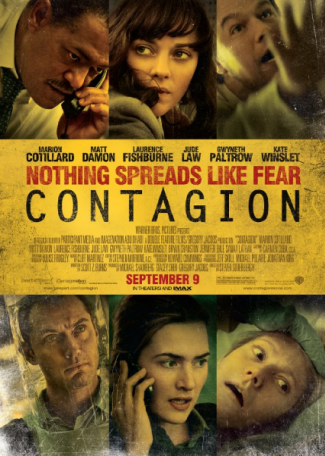By Michael Scoular (The Cascade) – Email
Date Posted: September 15, 2011
Print Edition: September 14, 2011
 Contagion is a movie marketed as a disaster filled with big name actors and high stakes. The end of the world. A virus that no one can get a handle on. It opens with matter-of-fact population numbers and closes with an earnest bit of text near the end of the credits that reads: “It’s not if, but when.”
Contagion is a movie marketed as a disaster filled with big name actors and high stakes. The end of the world. A virus that no one can get a handle on. It opens with matter-of-fact population numbers and closes with an earnest bit of text near the end of the credits that reads: “It’s not if, but when.”
It is with a similar straight-faced intensity that the events of Contagion play out. A scattershot of cities about to be inhabited with death are filmed with a paranoid lens. Conversations between higher-ups in organizations trying to control things are staged in an inert, distanced manner. Electronic music by Cliff Martinez adds an urgency to the events unfolding, but is also devoid of life. But for all the digital photography by Steven Soderbergh and A-list actors, there’s nothing to stand on. The script and story are brainless.
Early scenes showing disease control meetings feature Kate Winslet, whose sole purpose in the movie is fulfilled when she picks up a marker and takes down notes to explain some terminology to people whose job it is to know this as a second language. The rule in Contagion is that if you’re a known name actor, you have to act as a surrogate for the audience, taking in and spouting information very slowly, but if you aren’t, it’s allowable to let loose with the jargon. While the science of a disease is not a topic that can be easily avoided in a movie so concerned with one, the inadequacy of the script becomes immediately apparent every time Soderbergh falls back on his preference for dialogue-free, music driven montages. These interludes better communicate the fear of the epidemic, whatever progress is being made to solving it (none), and the gravity of the situation.
Over the course of the movie, these sequences recur to the point that it seems Soderbergh and Martinez are overcompensating for the script’s failings. The score, while a fine way to set the mood in the beginning, becomes intrusive the more it is used. While the scenes in which it is present are undeniably better than when dialogue takes the stage, the beats become repetitious to the point of distraction, even worse than in this year’s Hanna, which also used an electronic score. When a particularly loud, obvious synthesized note is played in a moment of tragedy, the effect is opposite to what a piece of music in a movie, at least a traditional one like Contagion, should have.
Still, the recurring pulsations work better than the dead weight that is Scott Z. Burns’s script. Particularly telling is that in the film’s most critical moments and its opening and closing scenes, not a word is spoken. The disquietude of an absence of speeches in these moments is far more effective than hearing supposedly well-educated adults utter phrases like: “Who should I call first?” “Call everyone,” “Nobody knows until everyone knows,” and some odd failed attempts at humour that work against the cold, distanced tone that Soderbergh appears to be striving for.
Then there are the ideas of conspiracy and how a widespread scare would play out with a world so connected through technology. Jude Law’s character features prominently in this area of the story. He announces the supposed truth of his website and proclaims somewhat coherent conspiracy theories yet (like most Hollywood movies that try to) sounds amusingly out of touch when trying to talk seriously about the effect of the internet and the way people connect on their views and reactions to catastrophic events. Throwing around terms like “blogosphere” and “unique visitors” don’t make a character sound intelligent.
Contagion as a present day, grounded disaster movie is a concept that is unoriginal, but not overused, and could have been the basis for a decent enough piece of entertainment. But the movie never quite escapes the Andromeda Strain mold and fails to completely deliver on the ideas it puts forth. What Steven Soderbergh’s latest ends up being is a half-hearted stab at the horrors of widespread information, paranoia, and the lack of humanity that comes with it. Contagion succeeds in establishing an uncomfortable vision of worldwide inevitability, then wastes away in mindless developments.


